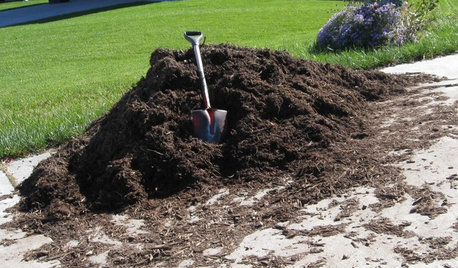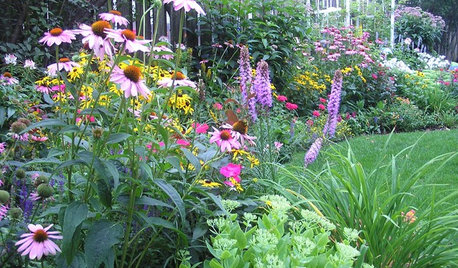Compost Tea vs Molasses Applied Directly to Lawn
canselmi
12 years ago
Related Stories

GARDENING GUIDESGet on a Composting Kick (Hello, Free Fertilizer!)
Quit shelling out for pricey substitutes that aren’t even as good. Here’s how to give your soil the best while lightening your trash load
Full Story
FRONT YARD IDEASBefore and After: Front Lawn to Prairie Garden
How they did it: Homeowners create a plan, stick to it and keep the neighbors (and wildlife) in mind
Full Story
GREAT HOME PROJECTSHow to Replace Your Lawn With a Garden
New project for a new year: Lose the turfgrass for energy savings, wildlife friendliness and lower maintenance
Full Story
GARDENING GUIDESHow to Fix Bare and Yellow Lawn Spots
Restore your turf’s good looks by reseeding unsightly patches
Full Story
GARDENING GUIDESHow to Switch to an Organic Landscape Plan
Ditch the chemicals for a naturally beautiful lawn and garden, using living fertilizers and other nontoxic treatments
Full Story
SAVING WATERXeriscape Gardens: How to Get a Beautiful Landscape With Less Water
Conserve water and make gardening much easier with the xeriscape approach’s 7 principles
Full Story
GARDENING GUIDESHouzz TV: Make a Worm Bin for Rich Soil and Happy Plants
A worm-powered compost bin that can fit under a sink turns food scraps into a powerful amendment for your garden. Here’s how to make one
Full Story
GARDENING GUIDESGive Your Turf the Fall Tune-up It Deserves
Treat your battered lawn to a little TLC this fall, and it will reward you with lush, healthy grass come spring
Full Story
LANDSCAPE DESIGNTry Slow Gardening for Some Unexpected Benefits
Why set your garden on the fast track? Here's how to relax and enjoy it in an entirely new way
Full Story
GARDENING GUIDESCalifornia Gardener: What to Do in July
Active green thumb or not, top priorities for peak fruit and veggie season: watering, feeding, keeping up with growth
Full StorySponsored






Kimmsr
canselmiOriginal Author
Related Professionals
Arlington Landscape Architects & Landscape Designers · Surprise Landscape Architects & Landscape Designers · West Milford Landscape Architects & Landscape Designers · Wixom Landscape Architects & Landscape Designers · Cincinnati Landscape Contractors · Lake Saint Louis Landscape Contractors · Live Oak Landscape Contractors · Petaluma Landscape Contractors · Vancouver Landscape Contractors · Silver Firs Landscape Contractors · Royal Oak Driveway Installation & Maintenance · Santa Paula Swimming Pool Builders · Columbia Fence Contractors · Surfside Fence Contractors · Severna Park Fence ContractorsKimmsr
dchall_san_antonio
freshair2townsquare
canselmiOriginal Author